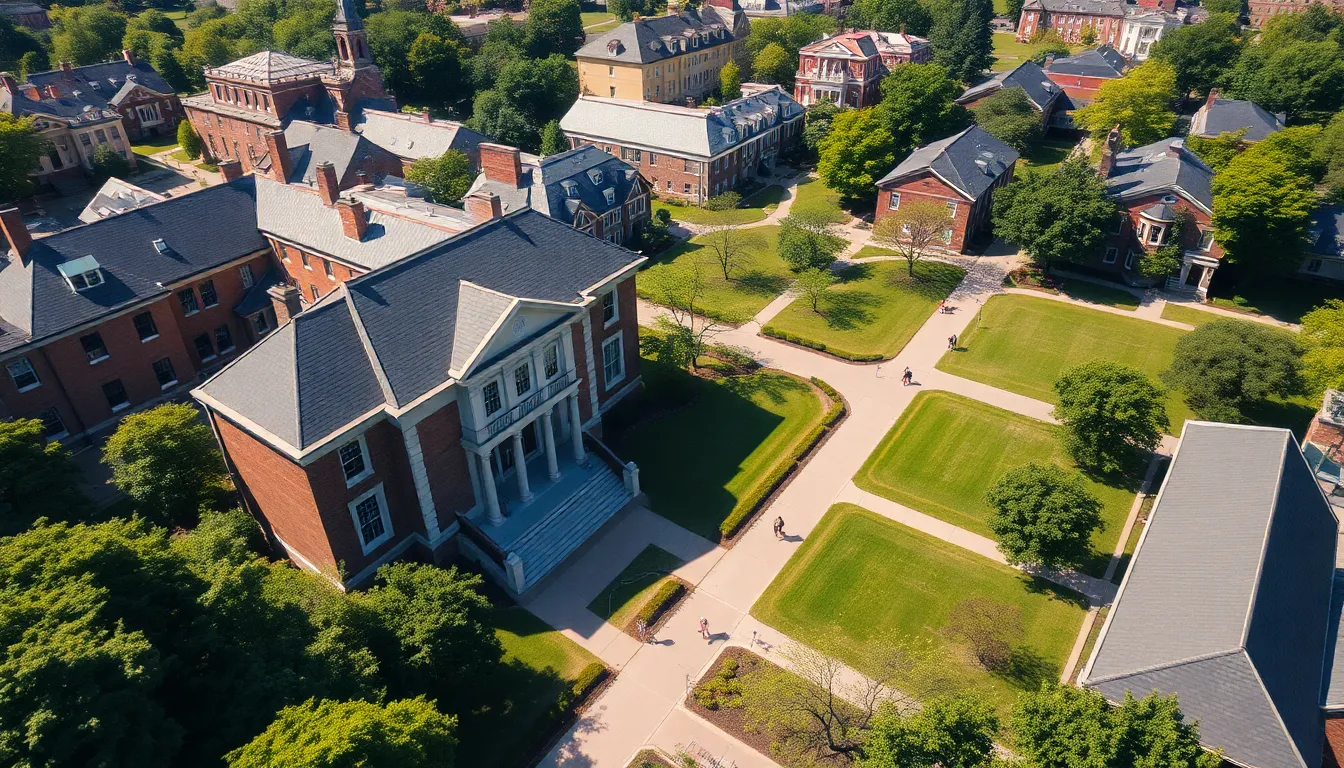When it comes to choosing a college, tuition can feel like a rollercoaster ride—thrilling and a bit terrifying. At Russell Sage College, the cost of education might just surprise you in a good way. Nestled in the heart of New York, this institution offers a blend of academic excellence and affordability that makes it stand out.
Table of Contents
ToggleOverview of Russell Sage College Tuition
Russell Sage College offers a competitive tuition structure designed to support students in achieving their educational goals. The undergraduate tuition for the academic year 2023-2024 is approximately $34,000. Many students benefit from various financial aid options, with about 90% receiving some form of assistance.
Room and board costs are around $17,000, adding to the overall price of attendance. In addition, mandatory fees total approximately $1,200. Students may also incur additional expenses for books, supplies, and personal items, which can range from $1,000 to $2,000.
The total estimated cost of attendance exceeds $50,000 annually when factoring in tuition, fees, room and board, and personal expenses. However, Russell Sage College maintains a commitment to affordability. Many scholarship opportunities exist, allowing merit-based financial assistance for qualifying students.
Despite higher education costs nationwide, Russell Sage College’s tuition remains relatively manageable compared to many private institutions. It’s crucial for prospective students to explore the various financial aid options and scholarships available. Engaging with the financial aid office can provide insights and solutions tailored to individual circumstances.
Awareness of deadlines for financial aid applications significantly contributes to securing assistance. Preparation before deadlines ensures students don’t miss opportunities for grants or scholarships. By taking these steps, students can effectively navigate the financial landscape of college.
Tuition Costs for Undergraduate Programs

Tuition for undergraduate programs at Russell Sage College for the 2023-2024 academic year stands at approximately $34,000. Additional expenses include room and board, which add around $17,000 to the total costs, alongside mandatory fees close to $1,200. When factoring in personal expenses, annual costs surpass $50,000. Such figures remain competitive compared to many private institutions.
Breakdown of Fees
Tuition represents a significant portion of the overall costs. Room and board account for approximately $17,000 annually. Fees, mandatory for all students, reach about $1,200. Personal expenses, which vary for each student, are crucial for estimating total costs. Planning these expenses provides a clearer financial picture for prospective students.
Financial Aid Options
Around 90% of students at Russell Sage College receive financial aid. Scholarships, grants, and loans offer various assistance routes. Engaging with the financial aid office is important for understanding available options. Students should also explore deadlines to secure needed resources. Comprehensive research often reveals untapped funding opportunities that can lower costs significantly.
Tuition for Graduate Programs
Tuition for graduate programs at Russell Sage College varies depending on the specific degree pursued. The cost is approximately $1,000 per credit hour.
Specialized Graduate Degrees
Russell Sage College offers specialized degrees across various fields, such as education, nursing, and health sciences. Tuition rates for these programs generally follow the same per credit hour structure. Programs like the MBA and DNP may include additional fees for resources or labs. Total tuition can exceed $30,000 for full-time students enrolled in these specialized tracks.
Additional Expenses
Additional expenses contribute significantly to the overall cost of graduate education. Students should plan for costs such as textbooks, supplies, and technology fees, which can range from $500 to $1,500 annually. Housing costs in Troy, New York, typically add another $12,000, along with mandatory fees nearing $1,200. Personal expenses, including transportation and dining, further inflate the total budget. An estimated yearly expenditure for graduate students can approach $50,000 when combining tuition, housing, and personal costs.
Comparison with Other Colleges
Russell Sage College’s tuition compares favorably with various educational institutions. Understanding regional and national trends helps prospective students make informed choices.
Regional Institutions
In New York, regional institutions generally charge higher tuition. For instance, state universities average approximately $50,000 annually, while private colleges near Russell Sage often exceed $60,000. Russell Sage’s undergraduate tuition of about $34,000 stands out in this context. When considering total costs, including housing and fees, many regional peers can reach $70,000. Financial aid options at Russell Sage remain robust, with about 90% of students receiving assistance. Such support enables students to manage costs more effectively in comparison to similar colleges in the region.
National Averages
Nationally, the average tuition for private colleges hovers around $38,000. Many institutions charge over $50,000 annually, making Russell Sage’s tuition competitive. Graduate programs similarly show substantial cost variations, with an average of $1,200 per credit hour nationwide. The diversity of tuition rates highlights Russell Sage’s affordability amidst rising education costs. Total estimated expenses for graduates often breach $60,000 or more at other institutions. By focusing on financial aid resources, students at Russell Sage can significantly reduce their overall financial burden compared to national averages.
Tips for Managing College Tuition
Managing college tuition involves strategic planning and exploring multiple funding sources. Careful consideration of financial aid options makes a significant difference.
Scholarships and Grants
Scholarships provide students with free money for tuition, reducing out-of-pocket expenses. Numerous organizations offer scholarships based on academic achievements, special interests, or financial need. Grants, often awarded based on financial circumstances, also help lessen the financial burden. At Russell Sage College, about 90% of students receive some form of financial aid, making these options vital for prospective attendees. Researching both institutional and external scholarships leads to additional funds. Applying early and meeting deadlines increases potential award opportunities.
Budgeting for College Expenses
Budgeting remains essential in managing college costs effectively. Understanding overall expenses, such as tuition, room and board, and personal fees, aids in financial planning. Students should outline monthly expenses, tracking discretionary spending to avoid overspending. Balancing income from part-time jobs or allowances with expenses keeps finances in check. By prioritizing needs over wants, students can allocate funds more wisely. Tools like budgeting apps streamline financial management, allowing for adjustments when necessary. Staying organized and proactive helps students maintain control over their college expenses, especially at Russell Sage College.
Russell Sage College offers a unique blend of quality education and affordability. With competitive tuition rates and a high percentage of students receiving financial aid, it stands out as a viable option for those seeking higher education without breaking the bank.
Prospective students should take advantage of the various financial aid resources available to them. By planning ahead and budgeting wisely, they can navigate the costs associated with college life more effectively.
Ultimately, Russell Sage College provides an accessible path to academic success while helping students manage their financial commitments.




